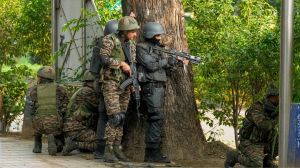Click here to join Express Pune WhatsApp channel and get a curated list of our stories
PCMC’s waste-to-energy plant to end issue of dry waste disposal
Residents of Moshi have been complaining about the pollution created by the PCMC's garbage depot.
 The PCMC claimed that the waste-to-energy project, which will have a capacity to generate 14MW electricity, will be the first-of-its kind in Maharashtra. (Express File Photo)
The PCMC claimed that the waste-to-energy project, which will have a capacity to generate 14MW electricity, will be the first-of-its kind in Maharashtra. (Express File Photo) The problem of disposing dry waste in the industrial city of Pimpri-Chinchwad is set to come to an end after Prime Minister Narendra Modi commissions the waste-to-energy plant of the Pimpri-Chinchwad Municipal Corporation (PCMC) on August 1.
The plant — which will have a capacity to convert 700 metric tonne of dry waste into electricity daily — will be the first-of-its-kind in Maharashtra, according to civic officials.
PCMC commissioner Shekhar Singh said on Saturday, “Every day, the plant will process 700 metric tonne of dry waste. This will help resolve the problem of disposing of the waste generated daily… The dry waste will be converted into electricity, which will be channeled to two of our projects. The plant will help us save Rs 20 crore annually.”
Pimpri-Chinchwad daily generates 1,150 metric tonne of garbage, of which 700 metric tonne is dry waste. “The remaining 450 metric tonne is wet waste, which is converted into compost,” said joint city engineer Sanjay Kulkarni.
The waste-to-energy plant has come up at PCMC’s garbage depot at Moshi on the Pune-Nashik Highway. The civic administration is planning to set up another depot at Poonawale but is facing opposition from residents. Stating that the problem of disposing dry waste will end once the waste-to-energy plant is commissioned, Singh said, “The plant will take care of the future increase in dry garbage. After this, we will be focussing on flattening the mounds of waste at the garbage depot through the process of bio-mining…There will be no further mountains of garbage as the waste generated will be daily converted to fuel.”
Residents of Moshi have been complaining about the pollution created by the PCMC’s garbage depot. “Once the waste-to-energy plant is commissioned, we are confident that locals will have no reason to complain. It is an environment-friendly project. The project aligns with the principle of ‘reduce, reuse and recycle’, making it a sustainable and efficient waste management solution,” said Singh.
The PCMC claimed that the waste-to-energy project, which will have a capacity to generate 14MW electricity, will be the first-of-its kind in Maharashtra. “As far as we know, there are three to four such plants outside Maharashtra, but none in our state,” said the civic chief.
Asked about the waste-to-energy plant set up by the Brihanmumbai Municipal Corporation, Singh said,”That project is a small one of about five tonne, based on bio-gas. Their project uses wet waste. They run the generator on biogas, from which electricity is produced. Our project will have a capacity to process 700 metric tonne of dry waste. We have a 500 metric tonne plant at Moshi which churns wet waste into compost.”
The municipal commissioner said the project is based on a ‘design, build, operate and transfer’ model on a public-private partnership. “Antony Lara Renewable Energy Private Ltd has set up the plant. We will be purchasing electricity from them at Rs 5 per unit. We have signed an agreement to the effect that our rate will remain the same for 21 years…,” Singh said.
Jose Jacob, chairman and managing director of Antony Waste, said, “The integrated project represents Maharashtra’s first such venture into waste-to-energy conversion and signifies a major milestone in the region’s sustainable development journey. The integrated project represents a crucial step towards achieving circularity in waste management practices. By converting non-recyclable waste into clean and renewable energy, the project will significantly reduce the burden on landfills…”
Jacob said that once the plant is made operational, it will process the dry waste produced by the city, eliminating the need for disposal. “The project adheres to the Municipal Solid Waste Management Rules of 2016, with emissions being monitored through the Continuous Emissions Monitoring System,” Jacob said.
Stating that the project will help save crores of rupees on power consumption, Singh said, “We have obtained most of the no-objection certificates from the MSEDCL for the project. The electricity generated through the project will be used at PCMC’s sewage treatment plant and water pumping facilities that will help us save 35-40 per cent in electricity bills…We will save at least Rs 20 crore every year.”
Click here to join Express Pune WhatsApp channel and get a curated list of our stories













